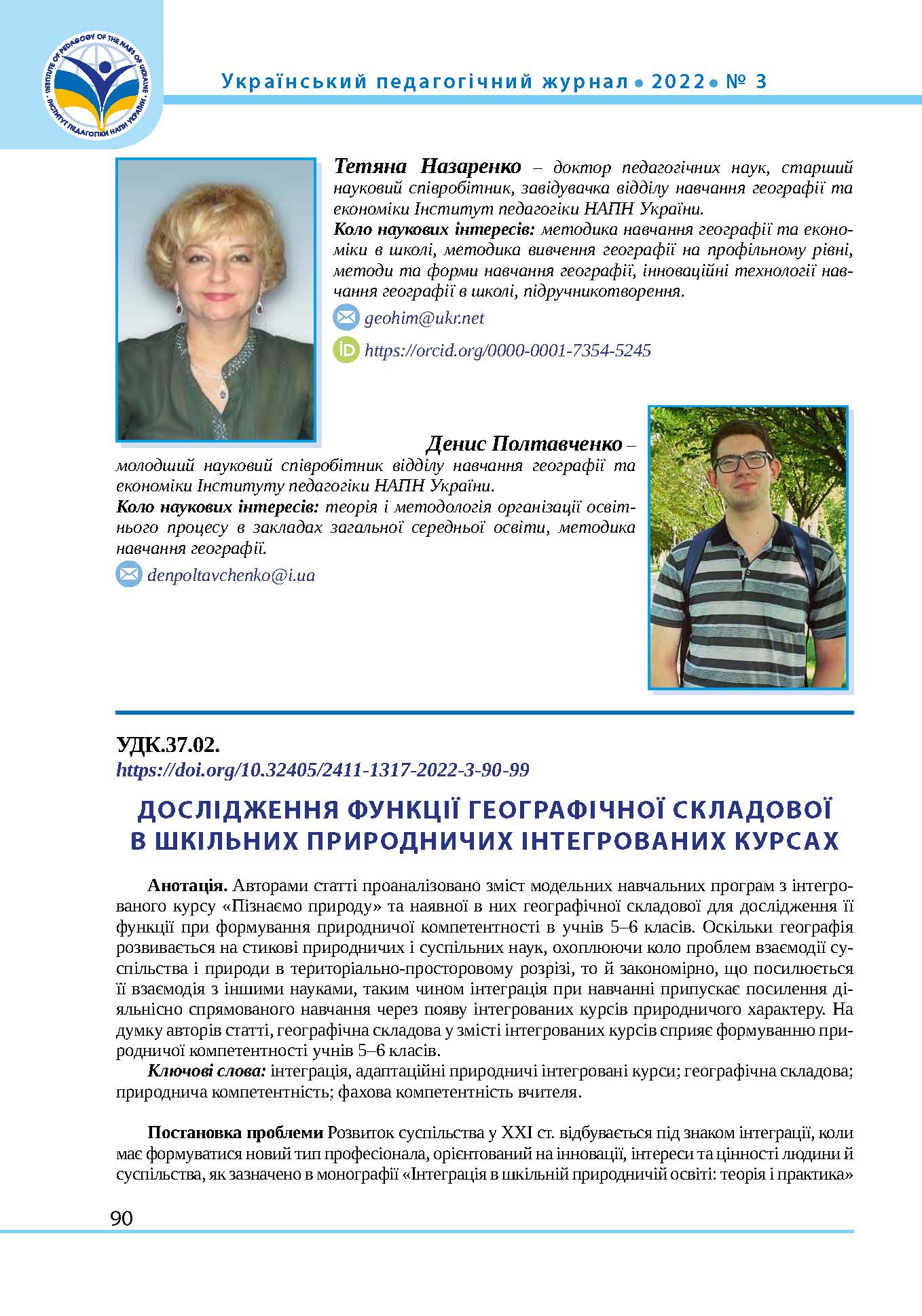Abstract
The authors of the article analyzed the content of the model curricula from the integrated course "Get To Know Nature" and the function of the geographical component in the formation of natural competence of students in grades 5–6. Since geography is developing at the intersection of natural and social sciences, and covering the range of problems related to the interaction of society and nature in a territorial-spatial section, it is quite natural that its interaction with other sciences is increasing. Thus, integration in education implies the strengthening of activity-oriented education through the emergence of integrated natural science courses. According to the authors, the geographical component in the content of the integrated courses contributes to the formation of natural competence of students in grades 5–6.
Having analyzed the works of international researchers, the authors came to the conclusion that the problems of implementing integrated education in general secondary education institutions of Ukraine correspond to world views, but require detailed study. The article examines the geographical component in the content of integrated natural science courses and its function in the formation of natural competence in students.
Geography is universal science and can be integrated with any academic subject if desired. It is closely related to many sciences: mathematics, chemistry, physics, economics, and others, which allows for both basic and prospective interdisciplinary connections. On the other hand, it is not necessary to combine all disciplines into one, because they lose their individuality and objectivity.
But integration gives rise to systematization, intensification of educational activities, mastery of the scientific picture of the world and culture as a whole, in particular language, because the type of culture determines the type of human consciousness. Therefore, integration is extremely relevant and necessary in the modern world and in the educational space, and the geographical component will only contribute to the content of integrated courses in Ukrainian schools.
This will be the basic principle of learning, since for successful everyday activities today there is not enough knowledge and skills, it is necessary to focus one's efforts on specific tasks, identify a problem, conduct an independent or joint search for ways to solve it, take responsibility for the results of actions and deeds.
References
Державний стандарт базової середньої освіти. (2020). https://www.kmu.gov.ua/npas/pro-deyaki-pitannya-derzhavnih-standartiv-povnoyi-zagalnoyi-serednoyi-osviti-i300920-898
Засєкіна, Т.М. (2020). Інтеграція в шкільній природничій освіті: теорія і практика: монографія. Педагогічна думка. http://lib.iitta.gov.ua/722404/1.pdf
Концепція НУШ. (2018). https://mon.gov.ua/ua/tag/nova-ukrainska-shkola
Модельна навчальна програма «Географія. 6‒9 класи» для закладів загальної середньої освіти. (2021). https://drive.google.com/file/d/1fJuTRkedVRRsdaS6iVAu4yTWhE25sHp3/view?usp=sharing
Модельна навчальна програма «Пізнаємо природу. 5‒6 класи (інтегрований курс)» для закладів загальної середньої освіти. (2021). https://drive.google.com/file/d/16E0INMV6rPP5V11WXdR5hZixUgozH_lo/view?usp=sharing
Назаренко, Т.Г. (2013). Методика навчання географії в профільній школі: теорія і практика: монографія. Педагогічна думка. http://lib.iitta.gov.ua/9886/.
Таксономія Б. Блума. (2017). https://www.criticalthinking.expert/usi-materialy/shho-take-taksonomiya-bluma-i-yak-vona-pratsyuye-na-urotsi/
Топузов, О.М., Надтока, О.Ф. (Ред.). (2018). Концепція навчання географії України в основній та старшій школі. ТОВ «Конві принт». http://lib.iitta.gov.ua/714119/1/%D0%BA%D0%BE%D0%BD%D1%86%D0%B5%D0%BF%D1%86%D1%96%D1%8F%20%28%D0%B2%D0%B8%D0%B4%D0%B0%D0%BD%D0%B0%29.pdf
Kirman, Joseph M. (2003). Transformative geography: ethics and action in elementary and secondary geography education. Journal of Geography, 102(3). https://www.tandfonline.com/journals/rjog20
Prokopenko, O., Osadchenko, I., Braslavska, O. and other. (2020). Competence approach in future specialist skills development. International Journal of Management, 11(4), 645–656.
Sezer, A., Yıldırım, T., Pınar, A. (2010). Examination of Computer Self-Efficacy Perceptions of the Students of Geography Teaching. Erzincan Teaching Faculty Journal, 12(2). https://www.researchgate.net/publication/294719254
Derzhavnyi standart bazovoi serednoi osvity. (2020). https://www.kmu.gov.ua/npas/pro-deyaki-pitannya-derzhavnih-standartiv-povnoyi-zagalnoyi-serednoyi-osviti-i300920-898
Zasiekina, T.M. (2020). Intehratsiia v shkilnii pryrodnychii osviti: teoriia i praktyka: monohrafiia. Pedahohichna dumka. http://lib.iitta.gov.ua/722404/1.pdf
Kontseptsiia NUSh. (2018). https://mon.gov.ua/ua/tag/nova-ukrainska-shkola
Modelna navchalna prohrama «Heohrafiia. 6‒9 klasy» dlia zakladiv zahalnoi serednoi osvity. (2021). https://drive.google.com/file/d/1fJuTRkedVRRsdaS6iVAu4yTWhE25sHp3/view?usp=sharing
Modelna navchalna prohrama «Piznaiemo pryrodu. 5‒6 klasy (intehrovanyi kurs)» dlia zakladiv zahalnoi serednoi osvity. (2021). https://drive.google.com/file/d/16E0INMV6rPP5V11WXdR5hZixUgozH_lo/view?usp=sharing
Nazarenko, T.H. (2013). Metodyka navchannia heohrafii v profilnii shkoli: teoriia i praktyka: monohrafiia. Pedahohichna dumka. http://lib.iitta.gov.ua/9886/
Taksonomiia B. Bluma. (2017). https://www.criticalthinking.expert/usi-materialy/shho-take-taksonomiya-bluma-i-yak-vona-pratsyuye-na-urotsi/
Topuzov, O.M., Nadtoka, O.F. (red.). (2018). Kontseptsiia navchannia heohrafii Ukrainy v osnovnii ta starshii shkoli. TOV «Konvi prynt». http://lib.iitta.gov.ua/714119/1/%D0%BA%D0%BE%D0%BD%D1%86%D0%B5%D0%BF%D1%86%D1%96%D1%8F%20%28%D0%B2%D0%B8%D0%B4%D0%B0%D0%BD%D0%B0%29.pdf
Kirman, Joseph M. (2003). Transformative geography: ethics and action in elementary and secondary geography education. Journal of Geography, 102(3). https://www.tandfonline.com/journals/rjog20
Prokopenko, O., Osadchenko, I., Braslavska, O. et al. (2020). Competence approach in future specialist skills development. International Journal of Management, 11(4), 645–656.
Sezer, A., Yıldırım, T., Pınar, A. (2010). Examination of Computer Self-Efficacy Perceptions of the Students of Geography Teaching. Erzincan Teaching Faculty Journal, 12(2). https://www.researchgate.net/publication/294719254

This work is licensed under a Creative Commons Attribution-NonCommercial-ShareAlike 4.0 International License.


